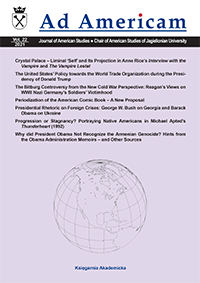The Bitburg Controversy from the New Cold War Perspective: Reagan’s Views on WWII Nazi Germany’s Soldiers’ Victimhood
The Bitburg Controversy from the New Cold War Perspective: Reagan’s Views on WWII Nazi Germany’s Soldiers’ Victimhood
Author(s): Grzegorz NyczSubject(s): Jewish studies, Fascism, Nazism and WW II, History of the Holocaust, Cold-War History
Published by: KSIĘGARNIA AKADEMICKA Sp. z o.o.
Keywords: Cold War propaganda related to WWII; Reagan’s public relations; US alliance with Germany; memory politics; Holocaust remembrance
Summary/Abstract: Why to go back to 1985 to discuss present-day key concerns of international relations fromthe perspective of World War II history during the Cold War? The May 5, 1985 Bitburg cemetery celebrations, when US president altogether with German chancellor (Helmut Kohl) paid tribute to WWII veterans (of both sides of the conflict) was an example of the Ronald Reagan administration’s public relations fiasco: the “Great Communicator” failed to refer to WWII history in a manner that would save him from harsh criticism. Importantly, the 1985 debate concerning the Bitburg ceremony and the moral aspects of a homage to German (Axis) WWII soldiers gave an incentive to “Historikerstreit” in Germany, a dispute regarding WWII history in a manner comparable to Holocaust responsibility as a collective burden carried by Germans. The Bitburg cemetery, since the 1930s a monument (Kolmeshöhe Ehrenfriedhof) to WWI German military victims, and then to their younger colleagues during WWII (Wehrmacht and, controversially, Waffen-SS) remained a broadly commented upon focal point of Cold War disputes, allowing such questions that might bring about a possibilityof ground-breaking change in present-day political rivalries caused by failed (or successful) Cold War propaganda related to WWII choices. The Bitburg case as a particularly illustrative one and could also shed more light on the post-Soviet Russian effort to increase its influence by relying on the myths of the “Great Patriotic War”.
Journal: Ad Americam. Journal of American Studies
- Issue Year: 2021
- Issue No: 22
- Page Range: 33-43
- Page Count: 11
- Language: English

